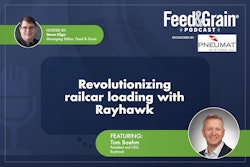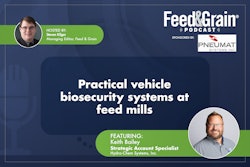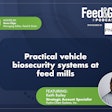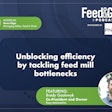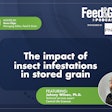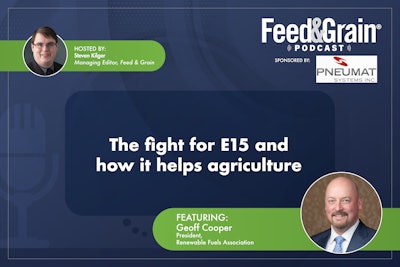
Transcript edited for clarity.
Steven Kilger - 00:01:
Hello! My name is Steven Kilger, I'm the managing editor for Feed & Grain Magazine and the host of the Feed & Grain Podcast. Thank you so much for joining me today as we dive deep into the issues affecting the feed manufacturing, grain handling and allied industries.
Today’s episode is brought to you by The BinWhip from Pneumat Systems. The powerful Dual Impact BinWhip removes the toughest buildup and blockages in industrial storage silos – without hazardous silo entry. Learn more today at binwhip.com.
In today’s episode my guest is Geoff Cooper, president of the Renewable Fuel Association. We’re discussing ethanol, why E15 is good for farmers and consumers, the battle to get E15 mixes year-round, and some of the criticisms levied against ethanol.
I hope you enjoy the interview. If you want to help with the podcast and are listening to this in a podcasting app, please rate us and subscribe! If you’re listening online, signup for the Feed & Grain Newsletter Industry Watch to see when new podcasts drop and stay up to date with all the latest news from around the industry.
Now onto the show.
Hi Jeff, thanks for talking to me today.
Geoff Cooper - 01:08:
Happy too, Steve. Morning.
Kilger - 01:10: For anyone who might not know you or what you guys do, can you tell me a little more about yourself and your involvement in the industry?
Cooper - 01:20:
Absolutely. So, I've been the CEO at the Renewable Fuels Association for about five years now. I've been with RFA for almost 17 years. So, I've been around the ethanol industry for quite some time. I was at the National Corn Growers Association working there prior to coming to RFA and I worked on ethanol issues at the Corn Growers Association in the 2003-to-2007-time frame.
So, there was obviously a lot of activity, a lot of growth in the industry, a lot of policy development happening at that time. So, I've really been around the industry for It's been a better part of the last 20 years and it's just been an exciting time to witness the growth of the ethanol industry and be a part of what we think is a tremendous success story for agriculture in the renewable fuel sector. It’s been a great experience working in the ethanol industry and leading the Renewable Fuels Association.
Kilger - 02:19:
Yeah, and it's been a big couple weeks for the renewable fuels industry in general. Recently the EPA issued an emergency waiver to permit E15 during the summer driving season and I know that was a huge push from you guys and it took a lot of people a lot of work to finally get that on their radar in the past. Lead to this decision and why is it so significant, especially for ethanol producers?
Cooper - 02:47:
Well, it has been a top priority for us, and we were excited to see EPA finally approving the use of E15 this summer. And just in case folks don't know, had EPA not taken that action on June 1st of this year, all those retail stations that are selling E15 would have had to stop selling the product. Which is ridiculous and it's really the result of an antiquated regulation that was put in place more than 30 years ago that never anticipated that we would be using gasoline blended with 15% ethanol in this country.
And so, because of that old regulation and that old statute that put in place back around 1990, we have a situation that every year around June 1st, or on June retailers offering E15 have stop selling the product and they can't resume selling the product until September 15th, which of course is after the busy summer driving season and peak demand cycle every year. So, EPA very wisely has decided to waive that sort of prohibition on E15 sales this summer. They did the same thing last summer and the year before as well.
So, we've had three years of uninterrupted sales of E15.And that's been great for the industry and great for consumers. But we're looking for a longer-term fix to this problem. So, we don't have to go to EPA every spring. And ask them for a waiver and hope that they give us one and cross our fingers that it gets done in time for summer. We’re looking for a more permanent solution that gets us out of this kind of annual game of looking for waivers and permanently resolves this issue. The problem is that would take legislation.
And so, we're working on that, but of course getting legislation, any sort of legislation through Congress these days is a challenge. So, in the absence of having that legislation, this summer waiver is the next best fix.
Kilger - 04:54:
Yeah. Well, that's the government for you, right? They drag their feet on everything, including stuff that just makes sense because obviously low fuel prices are better from everyone across the economy and it just, you know, but of course, you know, EPAs always got to drag it to the last minute. They’re not going to let you know they're working on this until they're ready to publish. So that's always fun, especially lately with, you know, the war in the Ukraine and tensions in the Middle East. And it just seems like oil prices keep going up and up and a lot of it's out of our control. Ethanol, one of the few things within our control.
So has that really helped push, I guess I want to call it, you know, the idea of E15 and what ethanol can do here in this country now that we know that. Oil supplies, they're not going to always reliably be there.
Cooper - 05:44:
Yeah, and that's exactly the justification that EPA has used to allow the use of E15 or the continued use of E15 on an emergency basis is they look at what's happening in the global energy markets. You mentioned the situation in Ukraine, the situation in the Middle East. There are tensions in Southeast Asia, of course. All of that is contributing to great uncertainty and volatility in the energy markets. You know, there's a lot of people that like to say, we're energy independent here in the U.S. We’re producing more crude oil today. We’re making all this natural gas.
We're not as reliant on imports as we used to be perhaps. And some of that is true. But what is also true is that the price of oil is still set on the global marketplace. And if somebody sneezes in the Middle East, or if there's some disruption at all in volatile parts of the world that either produce crude oil or where we see shipping lanes for crude oil.
If there's any sort of disruption in any of those places, it is going to affect Food oil prices around the world and that includes here in the United States, and we've certainly seen evidence of that in recent weeks and months. And then you know think back two years ago when we saw gas prices spike to over five dollars a gallon when Russia invaded Ukraine.
So, EPA looks at all of that and the Biden administration has looked at that said yeah if there are additional steps we can take To help insulate our economy from those sorts of price shocks and extend our fuel supplies here in the US with sources of energy, to your point that we do have better control over, let's do that. And so that's really one of the main drivers behind the decision to allow year-round E15 and we've seen E15 succeed in providing that relief.
Today E15 is typically priced anywhere from 10 cents to 30 cents per gallon below the price of regular gasoline. And so why would we take that away on June 1st? Why would we not double down and try to get more E15 in the marketplace to allow consumers to enjoy lower fuel prices? And that's what this action by EPA would do.
Kilger - 07:58:
Yeah, especially because like I said, this meeting of a waiver is all based on kind of outdated science from 30 years ago and does not consider, you know, modern engines and modern cars and things like that. And even today, I read something about some groups being upset with the aviation fuel standards and how they don't think ethanol should be involved, but ethanol is better for the environment ultimately. And if that's something we're really concerned about in this country, It's important. Do you have talking points and things for people who are into ethanol and just want to be able to debate this topic with regular people who might not understand quite the whole situation?
Cooper - 08:38:
Yeah, we do and we're happy to share those with anybody who is wanting to advocate on the ethanol industry's behalf or just get educated on the issues. But you're right, ethanol is hands down better for the environment than gasoline. There is not any legitimate scientific debate about the science overwhelmingly shows Ethanol reduces greenhouse gas emissions relative to gasoline. It reduces the tailpipe pollutants of things like nitrogen oxides and particulate matter and all those pollutants that contribute to poor air quality and human health problems, asthma, lung disease.
Ethanol reduces those emissions and there is an enormous body of science and research That shows that unfortunately we do continue to see people raising lots of myths and misinformation about the use of ethanol and its impacts on the environment. The big myth we hear is that boy if we're going to be using more corn for ethanol then we're going to have to massively expand our cropland in this country and we're going to have to cut down forest and we're going to have tear up native prairie grassland To plant more corn, to produce this ethanol. And if we do those things, then it negates any environmental benefit that ethanol would have.
Well, that's completely ridiculous. And when you look at the data, when you look at what has happened in this country, as we have vastly expanded production and use of ethanol, crop land continues to fall year after year after year. That trend began long before biofuels were around, and that trend has continued. In the biofuel’s era, so we are producing more corn and we're certainly producing more ethanol, but that increased supply of corn is not coming from additional acres. It’s coming from increased efficiency and higher yield and growing more corn on the same number of acres or on less land than we did several decades ago.
Kilger - 10:40:
Well, plus it assumes that, you know, that corn is just gone, which isn't true because ethanol does very useful byproducts like DDGs that are incredibly useful for the feed industry. And from what I understand, the technology with those is getting better and better too. So, they're producing higher quality byproducts. So, it's not like it's just gone. It’s there.
Cooper - 11:04:
That's right, and that's a great point that again is so often overlooked. When we take a 56-pound bushel of corn and run it through an ethanol plant, we're getting multiple products out the back end of that facility. Ethanol is only one of those. We get about close to three gallons of bushel of ethanol when you put that bushel of corn in a facility.
But you're also getting 15 or 16 pounds back as animal feed. Distillers’ grains and other co-products where the protein that was in that corn is concentrated and so is the fiber and some of the other nutrients that livestock and poultry need in their diets. And that co-product, distillers’ grains, has been a hugely successful and popular feed ingredient both here domestically in the U.S., but also worldwide.
We export close to one third of the distillers’ grains that this industry produces. We’re also producing corn oil, distillers corn oil, that itself is a valuable feed ingredient for poultry and certain other species, but it's also a feedstock that is used to produce renewable diesel fuel and biodiesel. So, these are just some of the things that are coming out the backside of an ethanol plant. And again, most people don't understand that these are really bio-refineries that are producing a wide array of products, not just ethanol.
Kilger - 12:29:
Yeah, it's a very efficient use of corn because we get so much out of it versus just, you know, a single use product. So, it's also good for agriculture, especially farmers because let's face it, producers have been hit with a lot over the last 10 years and they tend to get the short end of the stick when commodity prices go up and down. And lately it's, they've been trending down. So, this is helpful. Is that part of your message of like, hey, this is good for our rural communities and our producers?
Cooper - 13:04:
Absolutely it is and we are joined at the hip with agriculture and in fact I mean the ethanol industry would not exist today if not for the fact that 20 to 25 years ago we had farmers across the country coming together pooling their resources to build ethanol facilities in their rural communities as a way of developing a new market.
I mean I think we all remember what the corn market looked like in the 1990s and early 2000s, it was a surplus driven marketplace. We had high surplus levels, large record levels of carry out, low prices for corn, prices that were below the cost of production. And rather than continuing to rely on the government for income, asking the government to help keep these farms whole. Farmers got together and built from the ground up a new market for their product. They created a new market that has substantially added value.
To the products they're producing on the farm, and we look at the fact that there are roughly five billion bushels, five and a half billion bushels of corn going into the ethanol industry today. Again, not just making ethanol but stores grains and all those other products. And we think about where the corn market would be without that additional demand. There’s been a number of studies and analyses and economists that have looked at this and they have concluded that foreign prices aren't great right now, as you mentioned, but would be in real trouble.
Without the existence of robust demand for the ethanol industry, some studies have found that probably $1.50 to $2 or roughly one third of corn price that we've seen the past few years is attributable to demand from ethanol. So, it has been a real success story for rejuvenating the farm economy. And not only does it provide a new market for farmers and help raise their basis prices for corn, but it creates jobs in these communities as well.
And most ethanol facilities employ 50 to 60 people directly. But then there's also all those service providers and input providers and others whose jobs exist because of those facilities as well. So, it's really been great story for rural America and farm economy. And that's something we're very proud of.
Kilger - 15:30:
Yeah, no one likes to see farmers go out of business. They deserve stability. The whole industry really does deserve some stability. It’s disheartening when people kind of lose that part of it. And that's part of what this waiver does, right? It gives some stability to the ethanol industry, which also has to Figure out whether they can keep plants open, whether they have to shutter them during all these other things. Can you talk a little bit about what this means to the ethanol industry and their ability to just stay in business?
Cooper - 16:03:
Yeah, that's right. What the summertime waiver for E-15 does is keep the market open. Like I said, we're able to sell E-15 or retailers can sell E-15 from September 15 to June 1 every year. And so, what this waiver does is it keeps that market open. It keeps our facilities running. At high levels of output and capacity. And it allows for continued growth and continued expansion in the marketplace and in the use of E15.
And all of that, again, you trace it all the way back. And yes, that has an impact on the farm. It has an impact on planning decisions that farmers make. It has an impact on corn prices. And the decisions they're making with their own businesses. So that's why these decisions that come from bureaucrats in Washington DC are so important and have so much impact on lots and lots of people here in the Midwest and across country. And so yes, the main benefit of this waiver is it keeps a market open and keeps it in expansion mode for both corn producers and ethanol producers as well.
Kilger - 17:19:
Yeah, just the consistency alone. It’s hard to invest millions of dollars in new infrastructure. It’s hard for gas stations to get what they need to sell this stuff. If there's always this question of, well, is it going to be around for these three, four months during the year?
Cooper - 17:35:
That's right, and E15 is available today at about 3500 stations, somewhere between 3500 and 4000 stations. But we do still encounter a number of retail operators that have told us, well, we'd love to sell E15, we'd love to offer that product to our consumers. We like its lower price, we like its environmental attributes, but we are not going to make the investment to make even modest upgrades to our dispensers or other changes that need to be made unless we have the assurance that we can sell this product year-round. And that's why this is so important and why we need a permanent solution rather than ad hoc waivers every summer.
Kilger - 18:20:
Yeah, so the permanent solution, it sounds like that's the next big goal. Is there anything else that you guys are kind of advocating for, working on right now too, I know there was just big ruling by the IRS about sustainable aviation fuel credits, which is a mixed bag best. It seems like things are, at least it's on people's minds. So, is there anything else you're really pushing for right now?
Cooper - 18:44:
Securing a legislative fix for E-15 remains our top priority because we do believe that would have the most impact on our industry and on corn demand and ethanol demand and really keep the industry moving in the right direction. But in the longer term, we do see enormous opportunities for ethanol in non-traditional markets outside of the gasoline tank. And certainly, sustainable aviation fuel is one of those areas.
There’s been tremendous amount of work emerging in that arena. There’s actually the very first Facility in the world that will take ethanol and convert it to jet fuel began production earlier this year So it is a rapidly emerging market opportunity for ethanol but there's a lot of things that need to fall in place to get that right and really get that opportunity off the ground and that includes having tax policy that is supportive of further expansion in that industry and there was a recent ruling from the IRS.
That discussing how those tax credits will be implemented and we think it does begin to open the door to the use of corn ethanol as a source of sustainable aviation fuel but there's more work to be done and certainly some improvements that need to be made before that tax credit program is really going to kick open the door to large volumes of corn-based ethanol.
Kilger - 20:12:
If there are any listeners out there who want to get involved, want to send letters to their congresspeople, do whatever, you have sources for that? Where should they go to kind of learn more?
Cooper - 20:19:
Yeah, absolutely we do. And the best place to start is our website and that's ethanolrfa.org. But we also have all the social media channels and are very active on social media. So, if you want to see what's happening in the ethanol industry, if you want to see what's happening with policy and regulatory developments or in the marketplace, any of those sources are a great place to go. And we still do things the old-fashioned way too. People are always welcome to pick up phone and call us if they have questions or need information, want information. We love it.
When we get calls from people who say, hey, I've got a Rotary Club meeting, or I have something coming up where I'd like talk about ethanol. We're always happy to help provide the latest information and facts and data for folks who want to talk about the exciting things we're doing in our industry.
Kilger - 21:11:
Yeah, I mean, it's always frustrating working with the government on anything, but they do still listen to people coming up to them and saying, hey, this is what we want, and this is what we want to do and this is what we should think you be doing. Well, thank you so much for taking the time to sit down and talk with me today. I really appreciate it.
Cooper - 21:30:
All right, Steve, appreciate it.
Kilger - 21:35:
Thanks. And thank you to everyone out there for listening. Until next time, stay safe.


